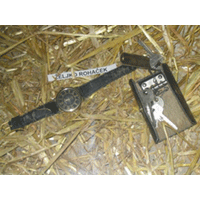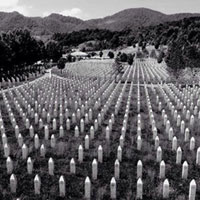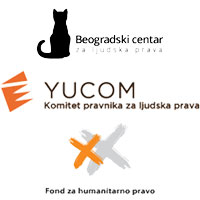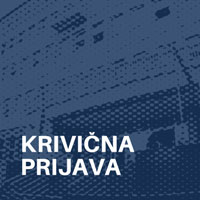(srpski) Anonimizacija čini žrtve nevidljivim za javnost

Sorry, this entry is only available in srpski.


Sorry, this entry is only available in srpski.

 The report by the Humanitarian Law Center (HLC) analyzes how are the existing mechanisms for public access to trials for war crimes applied and recommends necessary changes in the legislative framework and practice.
The report by the Humanitarian Law Center (HLC) analyzes how are the existing mechanisms for public access to trials for war crimes applied and recommends necessary changes in the legislative framework and practice.
The public’s right to know about the war crimes trials, as a minimum, includes the right to access the courtroom where trials are held and documentation of war crimes cases (indictments, judgements, transcripts and audio/video records of main hearings); the right to record a trial for the purpose of public presentation and the right to keep court records from war crimes cases. Out of the stated rights, only the right to access the courtroom and monitor the trial is strictly adhered to in Serbia and, therefore, it is not specifically analyzed in the Report. The public’s right to access relevant documents from war crimes trials is limited in practice by the refusal of courts to deliver judgments from proceedings that are not final and by excessive anonymisation of data.
The report is based on several years of practice of the HLC, that monitors national war crimes trials from the start, obtains relevant court documents and reports about them to the public.
The report “Public’s Right to Know of War Crimes Trials in Serbia” is available here.

 November 20th 2016 marks the 25th anniversary of the crime committed at „Ovčara“ farm near Vukovar, when members of the local territorial defense unit (Teritorijalna odbrana – TO) and Serb volunteers under the command of the Yugoslav People’s Army (JNA) killed 265 Croatian civilians and prisoners of war. The Humanitarian Law Center (HLC) on this occasion would like to remind the public that the trial of this case before the domestic courts has not yet been finally completed, even after more than 12 years.
November 20th 2016 marks the 25th anniversary of the crime committed at „Ovčara“ farm near Vukovar, when members of the local territorial defense unit (Teritorijalna odbrana – TO) and Serb volunteers under the command of the Yugoslav People’s Army (JNA) killed 265 Croatian civilians and prisoners of war. The Humanitarian Law Center (HLC) on this occasion would like to remind the public that the trial of this case before the domestic courts has not yet been finally completed, even after more than 12 years.

Sorry, this entry is only available in srpski.

 On 15 November 2016, the National Assembly of the Republic of Serbia opened the debate on the Bill on Amendments to the Criminal Code, which prohibits public approval and denial of genocide, crimes against humanity and war crimes, but only if those offenses have been established by the final judgment of a court in Serbia or the International Criminal Court. This would provide legal protection to revisionists of facts which have been established before the International Criminal Tribunal for the former Yugoslavia (ICTY) and the International Court of Justice (ICJ). The Humanitarian Law Center (HLC) calls upon the Members of the National Assembly to amend the proposed bill so that it includes a ban on the denial of facts established by the ICTY and the ICJ, in accordance with the domestic and international legal obligations of the Republic of Serbia.
On 15 November 2016, the National Assembly of the Republic of Serbia opened the debate on the Bill on Amendments to the Criminal Code, which prohibits public approval and denial of genocide, crimes against humanity and war crimes, but only if those offenses have been established by the final judgment of a court in Serbia or the International Criminal Court. This would provide legal protection to revisionists of facts which have been established before the International Criminal Tribunal for the former Yugoslavia (ICTY) and the International Court of Justice (ICJ). The Humanitarian Law Center (HLC) calls upon the Members of the National Assembly to amend the proposed bill so that it includes a ban on the denial of facts established by the ICTY and the ICJ, in accordance with the domestic and international legal obligations of the Republic of Serbia.

Sorry, this entry is only available in srpski.

Sorry, this entry is only available in srpski.

Sorry, this entry is only available in srpski.

 The Humanitarian Law Center (HLC) filed a criminal complaint on November 2, 2016, with the Office of the War Crimes Prosecutor of the Republic of Serbia, for a war crime committed in October 1991 against Croat civilians in the village of Lovas in Croatia (CRO).
The Humanitarian Law Center (HLC) filed a criminal complaint on November 2, 2016, with the Office of the War Crimes Prosecutor of the Republic of Serbia, for a war crime committed in October 1991 against Croat civilians in the village of Lovas in Croatia (CRO).
The complaint was filed against the former Commander of the Second Proletarian Elite Motorized Brigade of the Yugoslav People’s Army (JNA 2nd PEMBR), Dušan Lončar.
On October 9th, 1991, Dušan Lončar ordered an attack on the village of Lovas (East Slavonia) and the cleansing from the terrain of members of the Croatian National Guard and of the Republic of Croatia Ministry of the Interior, as well as of population ”showing hostility”. Early in the morning the following day, Lončar ordered the Howitzer Division of the JNA 2nd PEMBR to open fire and launch an artillery attack on Lovas, in which two Croat civilians were killed. Soon after this, members of the Dušan Silni (‘Dušan the Mighty’) volunteer unit entered Lovas, as part of the execution of the order issued by Lončar, and started shooting at random, and throwing hand grenades into backyards and houses. They killed several civilians while they were in their homes, and took others outside their houses and killed them in the street or other places, which resulted in the destruction and damaging of civilian property and the death of 21 civilians.